Slat armor
Slat armor (or slat armour, see spelling differences), also known as bar armor, cage armor and standoff armor, is a type of vehicle armor designed to protect against anti-tank rocket-propelled grenade (RPG) attacks. It takes the form of a rigid slatted metal grid fitted around key sections of the vehicle, which disrupts the shaped charge of the warhead by either crushing it, preventing optimal detonation from occurring, or by damaging the fuzing mechanism, preventing detonation outright. Although slat armor is effective against incoming missiles, it does not offer complete protection – as many as 50% of missile impacts are unimpeded by the slat design.[1] Slat armor is more likely to be effective if the cage spacing is less than the diameter of the incoming RPG round, which is commonly 85 mm in diameter.[2]
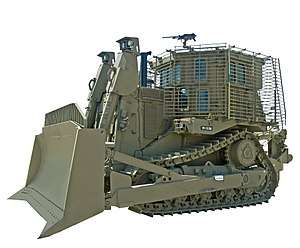
Combat history
World War II
The German Wehrmacht was the first employer of cage armor during World War II, using Drahtgeflecht-Schürzen (English: "wire mesh skirts") to fortify its tanks against shell fire.[3] It was found to be just as effective as the steel plate schürzen also being utilized. In March 1943, Adolf Hitler ordered all new Sturmgeschütz, Panzer III, IV, and Panthers be outfitted with schürzen of either the wire mesh or steel plate type. However, the wire mesh was not as easy to mass-produce as steel plate schürzen or armored skirts. Soviet Red Army tanks, faced with the new and highly effective German Panzerfaust, were similarly outfitted with "bedspring" armor made from expanded metal mesh grating panels.
However, schürzen was designed to stop Soviet PTRD-41 anti-tank rifles, so proved worse than useless against Bazooka and Panzerschreck anti-tank rockets in US and German tests[4].
Cold War era
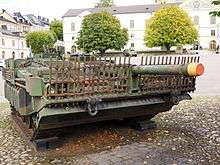
In the Vietnam War, slat armor was commonly used on the sides of American patrol barges and boats. The CCB-18 is a surviving example of the Mobile Riverine Force which used such armor.[5] Wire fencing was also placed on vehicles such as the M113 to defeat Vietcong RPGs. The Swedish Stridsvagn 103 of the same era employed a much heavier front-mounted metal grid to protect against incoming projectiles.
Modern era
In modern times, slat armor has seen use on the Israel Defense Forces (IDF) Caterpillar D9R armored bulldozer, the Force Protection Buffalo MPV MRAP vehicle, the General Dynamics Stryker, Ukrainian BTR-4, the Warrior Infantry Fighting Vehicle,[6] the M113 APC, the British Challenger 2, the Leopard 2A6 main battle tank,[7] and Russian T-62 tanks.[8] Slat armor is favored over traditional plate armor not only due to its effectiveness against shaped-charge warheads, but also due to its much lighter weight, which improves maneuverability.[9]
Slat armor was first used on the Israeli IDF Caterpillar D9R armored bulldozer in 2005, but was installed in large numbers only in 2006. Around the same time in 2005, slat armor was first proposed for the Stryker by a team of experts from the Army Research Laboratory (ARL), the Developmental Test Command, and the Aberdeen Test Center (ATC) to protect the vehicle from RPGs.[10] Within seven days, the ARL and ATC designed and produced the first prototype, which was later mass produced at the Lima Army Tank Plant in Ohio and implemented in different variants of the Stryker. The design of the slat armor has the cage placed 50 cm ahead around the vehicle, allowing an RPG warhead to explode at a safe distance.[2] In addition, the slat armor on the Stryker vehicles is reportedly effective against HEAT rounds.
In 2007, BAE Systems developed an extremely lightweight aluminum slat armor system called the LROD, which was initially used on the Buffalo MPV, and which was claimed to weigh half the amount of comparable steel designs.[6] BAE later equipped several US Army RG-31s with a variant of the LROD system, and also developed the system for its RG-33 vehicles, the Caiman and the JERRV. Slat armor is furthermore fielded on the American M1 Abrams as part of the TUSK urban warfare series. In the Syrian Civil War, ISIS, the Free Syrian Army and Syrian Army equipped their armored vehicles with homemade slat armor to protect from rocket propelled grenade impact.
In August 2016, Russia introduced bar-slat armor developed by NII Stali and Uralvagonzavod to increase protection of Russian armored vehicles against RPG and recoilless rifle HEAT rounds by 55-60%. The armor can be integrated with a variety of old-Soviet and Russian vehicles including the BTR-50/BTR-60/BTR-70/BTR-80/82/BTR-90, BMP-1/BMP-2/BMP-3, BRDM-2/BRDM-3, and T-14 Armata, with the full kit adding 1,000 kg (2,200 lb) of weight.[11]
Gallery
- Slat armor on an upgraded M113 Armored Personnel Carrier in 2008.
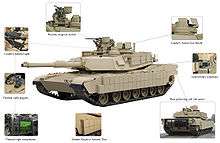 Depiction of the TUSK urban warfare system on the M1 Abrams; slat armor can be seen in the lower right, protecting the engine exhaust port at the rear of the hull.
Depiction of the TUSK urban warfare system on the M1 Abrams; slat armor can be seen in the lower right, protecting the engine exhaust port at the rear of the hull.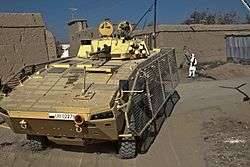 Lighter netting type fitted to a Polish KTO Rosomak in Afghanistan, 2010.
Lighter netting type fitted to a Polish KTO Rosomak in Afghanistan, 2010..jpg) Slat armor on a BvS 10 Viking ATV in 2012.
Slat armor on a BvS 10 Viking ATV in 2012.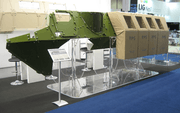
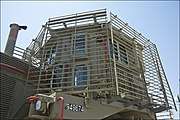 Close-up on the slat armor of an IDF Caterpillar D9 armored bulldozer.
Close-up on the slat armor of an IDF Caterpillar D9 armored bulldozer.
See also
References
- "BAE’s LROD Cage Armor". Defense Industry Daily. 17 August 2012. Retrieved 13 February 2015.
- Yap, Chun (September 2012). "The Impact of Armor on the Design, Utilization and Survivability of Ground Vehicles: The History of Armor Development and Use". Naval Postgraduate School – via Defense Technical Information Center.
- "Sturmgeschütze vor!" StugIII.com. Retrieved 12 February 2013.
- Bazooka vs Panzer, Battle of the Bulge 1944, Steven J. Zaloga, Osprey
- CCB Memorial Fund Archived 2014-10-06 at the Wayback Machine. MRFA.org. Retrieved 12 February 2013.
- "The MRAP Cage Fight". DefenseTech.org. 18 July 2007. Retrieved 4 October 2012.
- "Background — CF Leased & Purchased Leopard 2 A6M / 2 A4 Tanks" Archived 2008-04-16 at the Wayback Machine. CASR. Retrieved 12 February 2013.
- "A Russian serviceman reads next to a T-62 tank in Gori near South Ossetia, August 15, 2008". Reuters via Flickr. Retrieved 1 April 2012.
- "Slat Armour for Stryker". Defense-Update.com. 2005. Retrieved 12 February 2013.
- Rooney, John (January 2007). "Armor Testing, An Example of T&E for Rapid Acquisitions". ITEA Journal: 4–6 – via Defense Technical Information Center.
- Russia develops bar-slat armour to protect combat vehicles - Armyrecognition.com, 19 August 2016
External links
